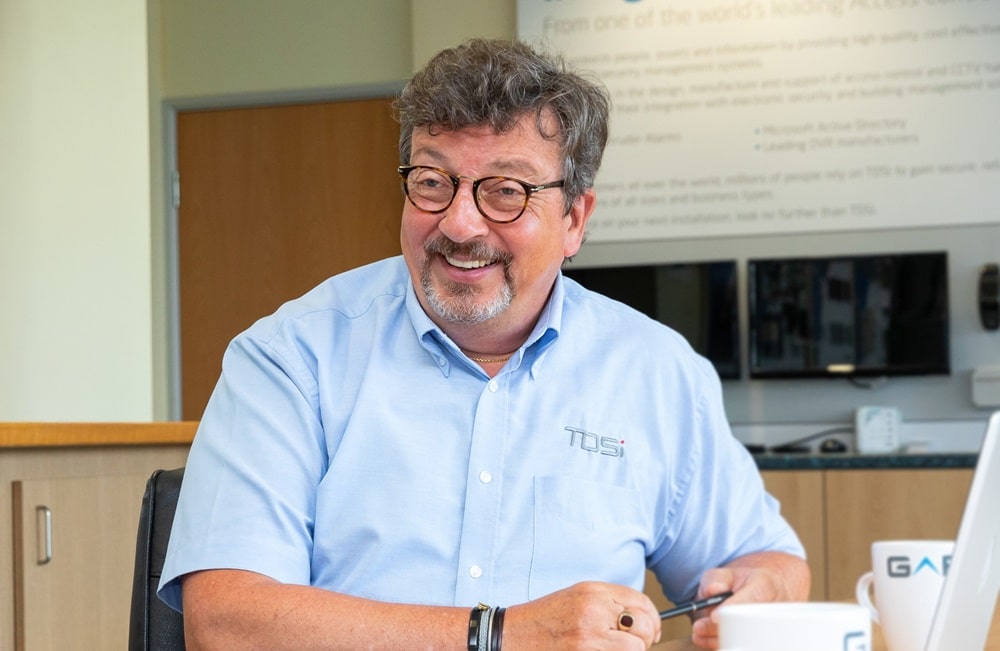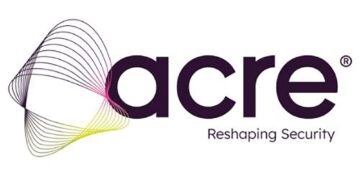Coming from a background working across Asia, America and around the world in engineering and then in software development, John Davies fitted easily into a new role, as Managing Director of TDSi in 2003.
He’s worked in very different industries – oil and gas engineering, and telecoms software development, being among them. What has connected Davies’ roles throughout the years, however, is that each job has been technology-related; innovation-led, and involved with integrating systems and data to solve problems.
But, in the 20 years since Davies joined TDSi in 2003, before buying out the company in 2005, it goes without saying that the security industry has changed a lot. So, as John Davies heads towards his retirement and enjoying more time on the golf course from this coming January, we ask how the industry has changed, about some of his career highlights, and challenges faced, and we explore his predictions for the future of access control, and the industry more broadly.
And could you tell me what have been some of the most memorable highlights of your career to date?
JD: “I am really proud about the relationship that TDSi has had with Panasonic, because that goes back to 2004. We were the first access control company to integrate to Panasonic’s iris recognition reader in 2004 and over the last 10 years, we’ve been working very closely with Panasonic business solutions in Thailand and Malaysia.
“When they do security projects, they’re using TDSI access control as part of that.

“We’ve done some pretty big projects across in Malaysia, Thailand and China. So, when people say, “you can’t compete with the Chinese if you manufacture in the West”, well, we’ve proven that it isn’t true.”
What would you say sets TDSi apart in the market, both in terms of product and innovation. In terms of product, are there any sort of products that you’ve provided that have really pushed the market forward?
JD: “At TDSi we’ve had a philosophy to bring the price point of integration down and to deliver that solutions capability to a larger marketplace. I think that’s been the core differentiator. We’ve tried to make our software easier to integrate into existing security systems and building management systems, and we want to deliver more than just access control.
“We know where people are in the building. We know how they interact with the built environment. So, as I mentioned before, it’s about offering that added value by helping our customers become more efficient and sustainable, by using that data to inform the heating, ventilation, and control systems, etc.”
What is it about yours, and TDSi’s, philosophy that have led to its success as a company?
JD: “Our motto involves three I’s – innovation, integration, inspiration. We want to create innovative products, we want products and software that easily integrates with other systems, and we want to create an inspiring working space, which allows people to flourish and create those products.
“So, when we hire people, we try and find out whether or not those things float their boat, because if they don’t, then yeah, they’re not going to fit in with everyone else.
“We spend more time finding out what makes someone tick. That’s the most important thing, then they can do the job.
“And if they don’t have all the skills to do the job, but they have what it takes, then yes, we’ll hire them, because we can train them exactly, and so that’s what we’ve done.”
And, as a leader of the brand, what have been some of the biggest challenges over the years? How have you met and overcome all of the challenges you faced?
JD: “There have been so many!
“We had the financial crisis in 2007/2008, which wasn’t long after I took over the company, but luckily, I had already made some efficiencies in the business by that point, so we were able to weather the storm.

“Then, in 2012 or 2013, Norbain went to the wall and that hurt the business. But we were able to overcome that.
“And I think three or four years before COVID, we had some suppliers and our customers in Asia saying, “what are you doing about SARS?”, so, at that point, we were looking at diversifying suppliers, making sure that we didn’t put all our eggs in one basket.
“That meant that when COVID hit, we were a bit more prepared than some, having made changes due to that experience.”

“Although the industry was deemed as key, we did put a lot of people on furlough, I think about 40% of the staff, but we actually paid them at 100% – topping up the 80% from the government. We split the workforce into two, so some people would work from home, and some would work in the office.
“All the development guys worked from home, and with them not being disturbed so much, they were actually more productive, and the amount of new code and integrations that we did in the early part of COVID was incredible. It was impressive.
“But there’s a lot to be said for face-to-face interaction, and COVID made interaction and communication harder.
“It was fortuitous that Vitaprotech took over in 2019. We didn’t need to worry about money and were allowed to do what we needed to keep the business running.
“Vitaprotech was able to take an opportunity to buy out smaller companies. We were the sixth company that was acquired by the group, but, by the end of COVID, there were 13 companies in the group. We were able to purchase a lot of smaller companies that had good technology, good products, but they’d run out of money, and so we were able to buy those companies. I think now the group is probably four times bigger than it was and that’s happened in five years.”
So, I suppose it was a time of great uncertainty, but also a time for opportunity?
JD: “Yes, and I think the most important thing is, sh!t happens. So, it’s about how you react when adversity hits.
“You don’t bury your head in the sand, you say, right, what do I need to do? How can I move things forward? Who do I need to talk to? How can I try and minimise the effect of whatever that crisis is?
“So, before the financial crash, we’d re-engineered the business, so that wasn’t an issue, and we didn’t need to make redundancies. During COVID, we didn’t make anyone redundant. Because we had planned.
“A lot of this nous has come from working in Japan. In Japan they’re very big on planning. I can remember being frustrated as a young engineer in project meetings where you plan and plan and nothing happens. But it’s important to be aware of all the possible consequences and potential issues that can spin you out of your control.
“This might consume an awful lot of time and energy initially, but it serves you in the long run.
“I used to be a runner, and I had to plan and train for marathons. You can’t just wake up one day and choose to win the race. You have to prepare for it.”
How has the industry changed over the years, culturally? For example, with a greater drive for equality, and what do you think the impact has been?
JD: “I think the security industry has always been conservative with a small ‘c’. It’s been ‘male, pale and stale’ for many years, but there’s more of a recognition now that we need to bring a younger, more diverse workforce into the industry.
“We still have a problem in the UK because we don’t produce enough engineering talent in this country. Thankfully, there’s been a lot of work over the last 10 years to educate people about a career in engineering, which in time should lead to a more diverse workforce emerging in the industry.
“Having a diverse workforce really broadens the way that you look at a problem and that means that the solution you come up with is more effective, because you’ve had a different perspective. Different people think differently and solve problems in different ways.

“We also ask all the employees to challenge everything – the way that we do things, all the time. It’s about small incremental changes that make evolutionary, big change over time.”
Looking forward, where do you think the security industry is headed, both in terms of access control and more broadly? Are there any up-and-coming brands that are impressing you and who are likely to be the big change makers?
JD: “In access control we’re going to see a move away from enterprise solutions, because that’s a finite market. It’s not going to grow that much, and there are so many players in that market that it’s about trying to steal a march over other people, but not growing as fast.
“The big opportunity is in the SME/SMB space. If you look at the worldwide enterprise access control industry, you’ve got commentators in the United States that say that that’s a $10 billion a year industry.
“But if you look at using access control interfaces, integrated with the built environment, and all with an enhanced user experience, that potentially is going to be a $100 billion a year business. It’s a massive difference. What’s driving that is software-as-a-service (SaaS), cloud, and people wanting to interact with their phone, so moving towards plug and play.
“So, I think you’re going to see a lot of people from outside of our industry recognising that there’s an opportunity, and you’ve got some big people doing it. Google are there, Amazon’s there, Apple are there. So, if security businesses don’t wake up, they’re going to have their lunch eaten. The businesses won’t disappear, but they won’t grow as dynamically as changes in the market could enable them to.
“Whoever wins over the next five to 10 years is going to have to think differently than the way we think right now. We have to try and learn from the enterprise software market. We have to learn SaaS to change our business model. We’re not selling products anymore. We’re selling a service. It’s not the “what” that we do, it’s the “why”, the “why are we doing it?” And, “why would something be important to someone?”
Are there any up-and-coming brands that are impressing you?

JD: “Wavelynx in the United States are impressive, and they’re going to give HID a run for their money, as far as readers are concerned. They’re also about identity management, and about enablement, and seamlessness. It’s about how people interact with the built environment, and putting those communities together and using that data to sell to other people.
“There’s also a company in Germany called any2any, and they’re about trying to connect different parts of the security, building, and management ecosystem, so that any2any means that anything can interact with anything else to any degree.

“What Legic are doing is also impressing me. They’ve developed a chip platform that will enable different things to talk to each other.
“These are all companies that are looking at making it easy to be interoperable with other things.”
Do you think these same companies will be the same change makers in the future?
JD: “I think Wavelynx can, if you look at the people behind the company. Private Equity firm Triton are backers, and Triton also has Acre Security in their portfolio, and they’ve also recently bought the security products arm of Bosch.
“These big PE groups are able to spend hundreds of millions of dollars, and they will make change happen. So, where you have areas of the security industry which are quite fragmented, be it CCTV or access control, the question is how can these big investment groups acquire technologies from small companies to increase their impact?
“So, you don’t want to subsume the new acquisition into the corporate way of doing things. You want to take their knowledge and pass it through to the rest of the organisation. That’s going to be a good thing. I think there’s going to be a lot of that over the next five years.”
And, do you think there’s going to be much more innovation to be seen? For example, with AI and other technologies?
JD: “Generative AI is going to have a huge impact on not just the security industry, but all industries. But people shouldn’t be scared of it. It should be seen as a tool that enables us to do better things – to be more efficient, to have the time, or to generate the time, to have a better work life balance, because that’s good for everybody. And while right now we’re seeing AI used in video technologies, I think there’s going to be more and more of that coming to access control and the physical security world as well.”

And how do you feel about TDSi as you leave the brand and the new Vitaprotech management team taking over?
JD: “There’s a real desire in the group to make sure that the brands that have been purchased are respected, but we look at efficiencies and what sort of ecosystem is put together. For example, the software development team here at TDSi now writes software for other parts of the group as well.
“We’re looking at creating efficiencies and synergies. So, as I leave TDSi, I think the opportunities that people have within the company for their own growth is enhanced, and opportunities for growth outside of TDSi in other parts of the group are also enhanced. There’s going to be more choice for people, and there’s going to be more security of tenure.
“I started to look for someone to buy TDSi in 2017 and we spoke to a few companies before deciding to go with Vitaprotech, and that’s because Eric Thord, who runs Vitaprotech, it was his idea to put it all together in this way. He wants to create what I wanted to create with TDSi, but I didn’t have deep enough pockets. So, I am confident the brand is in good hands. It’s going to be great.”
Finally, is there anybody that you’d like to give a special shout out to? It could be anyone inside or outside the industry who’ve been supportive over the years or really impressed you.
JD: “There’s one person that’s impressed me outside of the industry, a guy called Simon Sinek, and his whole message is about it’s not what you do, is why you do it. It’s about the purpose of an organisation. Why is it there?
“So, the ‘what’ for us is access control. There are hundreds of access control companies. So, what sets us apart from everybody else is the motivations that we have, it’s about why we come to work. And that philosophy, that way of thinking, has really impressed me.
“In terms of colleagues in the industry, I can mention Ian Moore, Jim Ludwig, and Mark Tibbenham. The four of us put together what we called the Harmony Alliance 10 years ago. These were four separate businesses that had intruder alarms, power supplies, sensing technology, etc. We were like the Four Musketeers. They’ve all gone on to do good things.
“I’d also like to shout out to Tristan Norman, who started The Security Event. IFSEC had lost its way and the organisers thought they knew more than we, within the industry, did. TDSi was a founding partner for TSE, and that show is just growing from strength to strength. I really love that.
“Within TDSi, I would like to mention Tina Baker, who heads our development team. She came to us as an apprentice software engineer, straight out of university 19 years ago. She now runs that team, and that team now writes software, not just for TDSi, but other members of the Vitaprotech group as well. To see her grow and her career progress has made me feel very happy.”
For more TDSi news, click here





